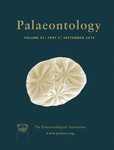Reg. Charity No. 1168330

Taxonomic and ecological recovery from the Cretaceous–Palaeogene (K–Pg) mass extinction 66 million years ago shaped the composition and structure of modern ecosystems. The timing and nature of recovery has been linked to many factors including palaeolatitude, geographical range, the ecology of survivors, incumbency and palaeoenvironmental setting. Using a temporally constrained fossil dataset from one of the most expanded K–Pg successions in the world, integrated with palaeoenvironmental information, we provide the most detailed examination of the patterns and timing of recovery from the K–Pg mass extinction event in the high southern latitudes of Antarctica. The timing of biotic recovery was influenced by global stabilization of the wider Earth system following severe environmental perturbations, apparently regardless of latitude or local environment. Extinction intensity and ecological change were decoupled, with community scale ecological change less distinct compared to other locations, even if the taxonomic severity of the extinction was the same as at lower latitudes. This is consistent with a degree of geographical heterogeneity in the recovery from the K–Pg mass extinction. Recovery in Antarctica was influenced by local factors (such as water depth changes, local volcanism, and possibly incumbency and pre‐adaptation to seasonality of the local benthic molluscan population), and also showed global signals, for example the radiation of the Neogastropoda within the first million years of the Danian, and a shift in dominance between bivalves and gastropods.
AcknowledgementsThis study is a part of the British Antarctic Survey Polar Science for Planet Earth Programme. We appreciate the help of Hilary Blagbrough with access to BAS collections and technical support. We thank the staff of the Paleontological Research Institute (Ithaca) for assistance with access to the W. J. Zinsmeister collection. This work was funded by NERC (UK) grants NE/I005803/1 and NE/C506399/1, and a PhD scholarship from the University of Leeds to JDW. A Lerner‐Gray Research grant from the American Museum of Natural History to RJW is also acknowledged. We thank the anonymous referees who commented on an earlier draft of this manuscript.
RJW and JDW compiled the data, conducted the analyses and wrote the manuscript as joint first authors. RJW, VCB, JAC, JEF and JI collected the specimens. RJW, JDW, VCB, JAC, JEF and JI edited the manuscript.